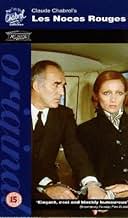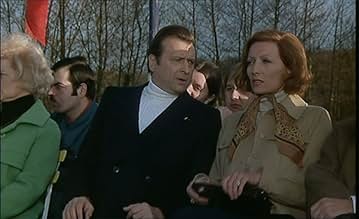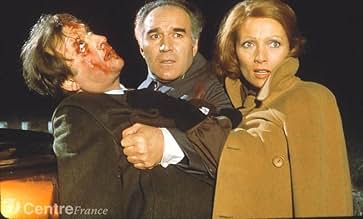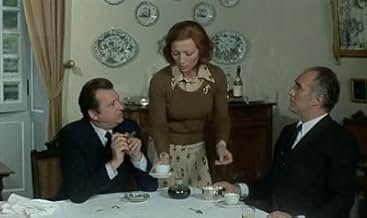Les noces rouges
- 1973
- Tous publics
- 1h 35m
IMDb RATING
6.9/10
2.2K
YOUR RATING
In a small French town, the mayor discovers his wife is cheating on him, a betrayal that eventually leads to murder.In a small French town, the mayor discovers his wife is cheating on him, a betrayal that eventually leads to murder.In a small French town, the mayor discovers his wife is cheating on him, a betrayal that eventually leads to murder.
- Awards
- 1 win & 1 nomination total
- Director
- Writers
- All cast & crew
- Production, box office & more at IMDbPro
Featured reviews
By no means one of Chabrol's finest this is nevertheless most watchable and the most agreeable and sinister soundtrack always suggests this may become something much grander. As it is it is a fairly predictable tale with the odd twist but leaves the two leads/lovers ending up looking rather stupid. I'm sure Mr Chabrol, like his mentor, Hitchcock found himself a little less than at ease with the ladies. Hence his wife Stephane Audran and Michel Piccoli, two great actors, but who it has to be said, are both so seemingly lacking in passion, are asked to convince that they would gladly rush to a riverbank or rooms within a stately home to make wild, passionate love. I don't think so! Claude Pieplu is great fun as the at first pompous and later calculating cuckold husband and although we are assured he is not 'up to the job' he seems to have far more fire in him than the other two. Certainly worth watching this is a curious example of the director's work and just goes to show that, again like Hitchcock, even his lesser films are at least interesting, if a little awkward.
Under the surface of middle class boredom and entrapment, love for the forbidden and unattainable drives two respectable, kind people to murder. It isn't realistic, yet feels real, as does the daughter's unconscious urge to destroy her beloved mother. The murder victims are at once pitiable and richly deserve their ends. The performances are great all round.
I was very surprised upon reading some of the comments for this film after having seen it - not only is this not a lesser Chabrol movie or a non-entertaining one, for my money its Chabrol at his subtle and intriguing best, and no doubt up there with the likes of The Unfaithful Wife and Le Boucher! The plot is not particularly original, but it's not too important as it's Chabrol's style and attention to detail that really makes the film what it is anyway. The plot seems to take a lot of influence from the classic 'The Postman Always Rings Twice' and focuses on murder due to an illicit love affair. Lucienne Delamare is not so happily married to town major Paul Delamare and, unbeknown to her husband, is currently engaged in an affair with her husband's assistant Pierre Maury. The two are able to spend time together because Paul is often away on business. Pierre's wife Clotilde is weak and sick and when she dies suddenly, the town suspect suicide; but the truth is more sinister, as revealed by Pierre's confession to Lucienne...
The film is kept interesting as Chabrol always focuses on the important elements and ensures that the chemistry between the leads is always engaging. The acting is once again superb with Chabrol's beautiful wife (at the time) Stéphane Audran being suitably brooding and mysterious in the lead role and receiving excellent support from Michel Piccoli and Claude Piéplu. The village in which the film takes place is also well thought out and Chabrol manages to create a foreboding atmosphere stemming from that. As usual with Chabrol films, this one is beautifully shot and realised and it's clear that the director put a lot of care and attention into the film. As usual, the suspense is generated through intrigue and the way that the characters are developed rather than through scenes of tension, though there are some brilliant sequences in the film - a pivotal scene towards the end involving a car accident being particularly noteworthy. I wouldn't recommend this film as a starting point for someone who has not previously seen a Claude Chabrol film, but I'd be surprised if fans of his don't enjoy it. Highly recommended!
The film is kept interesting as Chabrol always focuses on the important elements and ensures that the chemistry between the leads is always engaging. The acting is once again superb with Chabrol's beautiful wife (at the time) Stéphane Audran being suitably brooding and mysterious in the lead role and receiving excellent support from Michel Piccoli and Claude Piéplu. The village in which the film takes place is also well thought out and Chabrol manages to create a foreboding atmosphere stemming from that. As usual with Chabrol films, this one is beautifully shot and realised and it's clear that the director put a lot of care and attention into the film. As usual, the suspense is generated through intrigue and the way that the characters are developed rather than through scenes of tension, though there are some brilliant sequences in the film - a pivotal scene towards the end involving a car accident being particularly noteworthy. I wouldn't recommend this film as a starting point for someone who has not previously seen a Claude Chabrol film, but I'd be surprised if fans of his don't enjoy it. Highly recommended!
Claude Chabrol started as part of the nouvelle vague,as contemporary of Truffaut and -yuk!- Godard ,but his roots are in the old cinema,that of Clouzot and Duvivier.That's why his best movies hold up very well today.
A first golden era included such works as "à double tour" "le beau Serge" and "les cousins".Then came a period of barren inspiration which ended with "les biches" (1967) with which Chabrol entered his most fruitful period the 1967-1973 era:at least five of the works of this time are first-rate works :"la femme infidel" (1968;dubious American remake);"the beast must die" (1969) ;"the butcher" (1969) his towering achievement;"la rupture"(1970) his most underrated ;"juste avant la nuit" (1971) and finally "les noces rouges" which seems today as the last hurrah,a farewell to a golden era.
Unlike the four other films I mention "les noces rouges" is based on a true story which was widely talked about in France of the early seventies.But ,true or not,Chabrol's touch is strong and he makes the story a chabrolesque plot to the core.The bourgeois whom Chabrol depicted in "la femme infidel" or "la rupture" ,and who was played by Michel Bouquet has turned into a caricature.Enter Claude Piéplu,and with his high-pitched voice,he almost overshadows the excellent Stephane Audran and Michel Piccoli.An impotent self-satisfied mean bourgeois with political ambitions ,he accepts his wife's(Audran) affair with his deputy mayor(Piccoli) ,more,it's fine with him because it will be useful for his shady business.The scene when he tells the lovers so is incredible;lines such as "I want everybody to be happy around me!" he delivers to a stunned Piccoli and a bewildered Audran give goose pimples.
You will notice the omnipresence of water:in "que la Bete meure" and "le boucher" ,it symbolized a return from hell,not necessarily a happy end but a world with some peace of mind.In "les noces rouges" it appears during the love scenes (played by the two actors with more gusto than usual :never in a Chabrol movie the carnal act had been -and will be-so much to the fore)as a symbol of innocence (after all, the two people have no sex with their legal partners)in the sin.But it's the heroine's daughter ,called Helene ,who epitomizes innocence and some kind of deus ex machina.
What's more puzzling is that Stephane Audran's characters were all called Hélène in the four other movies I mention:in "la femme infidel' Helene had a lover but with some excuse :her husband appeared like a washout sexually;in "le boucher" she was a brave schoolteacher ,purity flesh on the bone;in "la rupture" her character had to fight against a hostile bourgeois world .In "les noces rouges" Audran ,called Lucienne,is on the other side of the mirror:she really becomes a criminal,almost in a dream .When her daughter,Hélène,who took the place she occupied in former movies asks her "I want you to be happy,mom,please tell me the truth" Audran does not seem to realize all that means.And when she does,it will be too late.
Les noces rouges" is also a movie which depicts political life circa 1970 in a small town where gossips run rampant.And as usual,Chabrol is marvelous when it comes to painting vignettes of ordinary life -see the scene in the library-
It would take Chabrol five years to muster this sort of command ("Violette Nozieres" (1978)),and although he has occasionally made great works ("l'enfer" " la cérémonie" ),he will be remembered in fifty years or so for those gems of the late sixties/early seventies era."Les noces rouges" is a must.
A first golden era included such works as "à double tour" "le beau Serge" and "les cousins".Then came a period of barren inspiration which ended with "les biches" (1967) with which Chabrol entered his most fruitful period the 1967-1973 era:at least five of the works of this time are first-rate works :"la femme infidel" (1968;dubious American remake);"the beast must die" (1969) ;"the butcher" (1969) his towering achievement;"la rupture"(1970) his most underrated ;"juste avant la nuit" (1971) and finally "les noces rouges" which seems today as the last hurrah,a farewell to a golden era.
Unlike the four other films I mention "les noces rouges" is based on a true story which was widely talked about in France of the early seventies.But ,true or not,Chabrol's touch is strong and he makes the story a chabrolesque plot to the core.The bourgeois whom Chabrol depicted in "la femme infidel" or "la rupture" ,and who was played by Michel Bouquet has turned into a caricature.Enter Claude Piéplu,and with his high-pitched voice,he almost overshadows the excellent Stephane Audran and Michel Piccoli.An impotent self-satisfied mean bourgeois with political ambitions ,he accepts his wife's(Audran) affair with his deputy mayor(Piccoli) ,more,it's fine with him because it will be useful for his shady business.The scene when he tells the lovers so is incredible;lines such as "I want everybody to be happy around me!" he delivers to a stunned Piccoli and a bewildered Audran give goose pimples.
You will notice the omnipresence of water:in "que la Bete meure" and "le boucher" ,it symbolized a return from hell,not necessarily a happy end but a world with some peace of mind.In "les noces rouges" it appears during the love scenes (played by the two actors with more gusto than usual :never in a Chabrol movie the carnal act had been -and will be-so much to the fore)as a symbol of innocence (after all, the two people have no sex with their legal partners)in the sin.But it's the heroine's daughter ,called Helene ,who epitomizes innocence and some kind of deus ex machina.
What's more puzzling is that Stephane Audran's characters were all called Hélène in the four other movies I mention:in "la femme infidel' Helene had a lover but with some excuse :her husband appeared like a washout sexually;in "le boucher" she was a brave schoolteacher ,purity flesh on the bone;in "la rupture" her character had to fight against a hostile bourgeois world .In "les noces rouges" Audran ,called Lucienne,is on the other side of the mirror:she really becomes a criminal,almost in a dream .When her daughter,Hélène,who took the place she occupied in former movies asks her "I want you to be happy,mom,please tell me the truth" Audran does not seem to realize all that means.And when she does,it will be too late.
Les noces rouges" is also a movie which depicts political life circa 1970 in a small town where gossips run rampant.And as usual,Chabrol is marvelous when it comes to painting vignettes of ordinary life -see the scene in the library-
It would take Chabrol five years to muster this sort of command ("Violette Nozieres" (1978)),and although he has occasionally made great works ("l'enfer" " la cérémonie" ),he will be remembered in fifty years or so for those gems of the late sixties/early seventies era."Les noces rouges" is a must.
I believe this film is based on a real double murder by Bernard Coustie in 1970, and follows that closely until the final scenes. I was shocked by the Benny Hill quality of the love scenes which undermines the early scenes. The acting as a whole has a semi-comic feel and the film is short and feels perfunctory - if it wasn't Chabrol would we even remember it?
However, the score is terrific, and as a time-capsule of small town France it is entertaining.
Did you know
- ConnectionsFeatured in La cérémonie (1995)
- How long is Wedding in Blood?Powered by Alexa
Details
- Release date
- Countries of origin
- Language
- Also known as
- Wedding in Blood
- Filming locations
- Valençay, Indre, France(main location: street scenes, cemetery, Maury's apartment 31 Rue de la République)
- Production companies
- See more company credits at IMDbPro
- Runtime1 hour 35 minutes
- Sound mix
- Aspect ratio
- 1.66 : 1
Contribute to this page
Suggest an edit or add missing content














